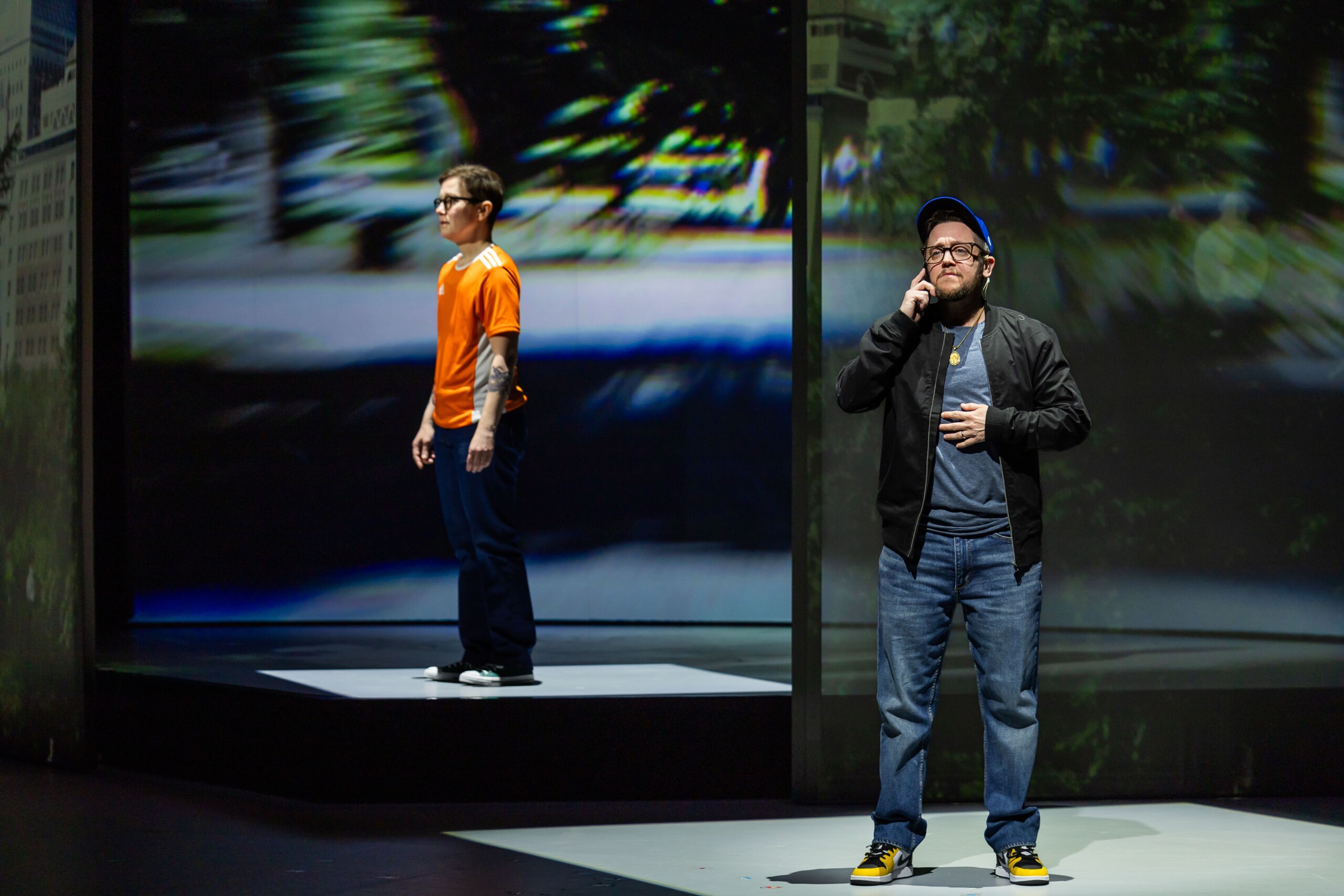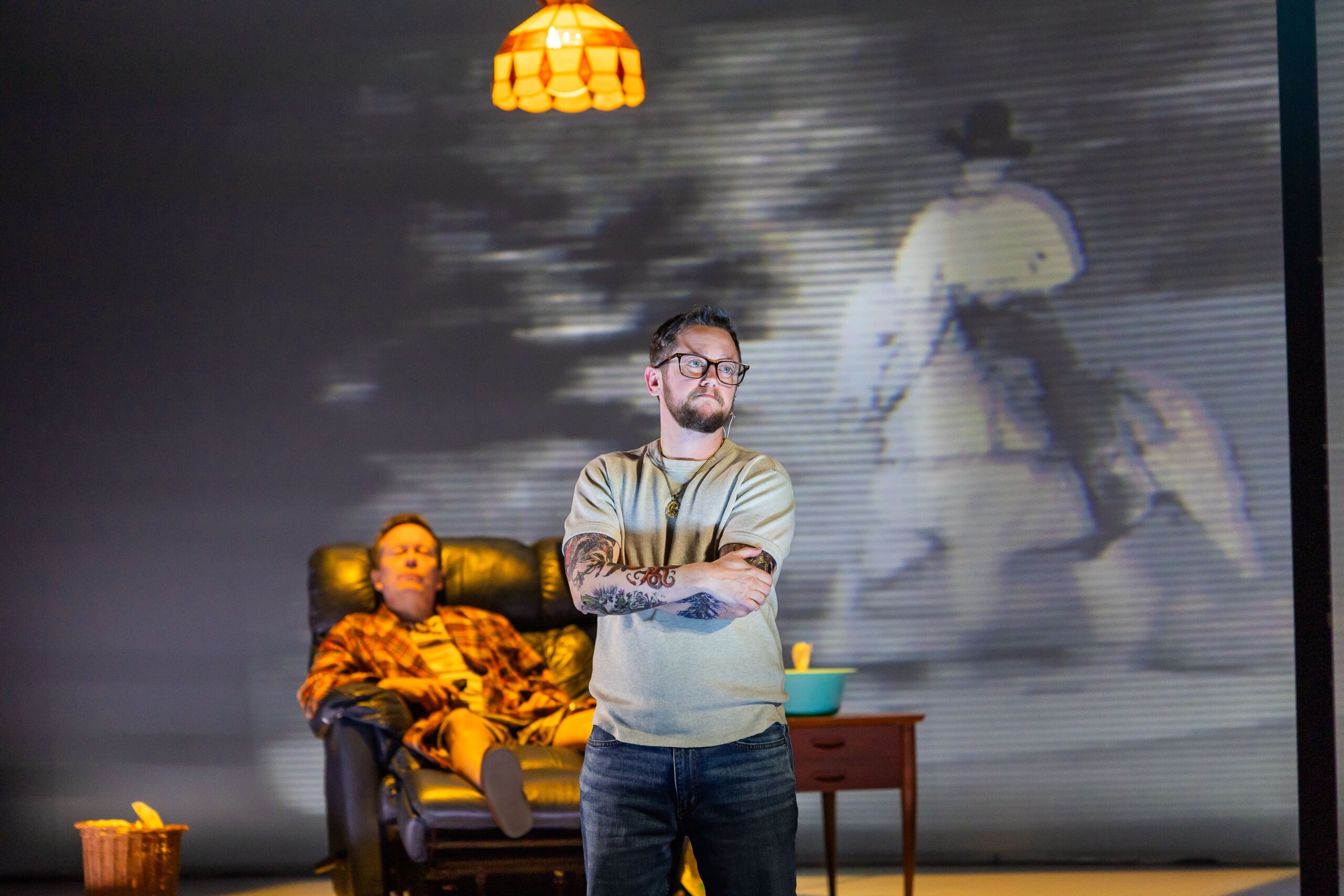Becoming a Man is a new play about transitions, premiering at the American Repertory Theater. The play was written by P. Carl, based on his memoir of the same name about . Carl is also an artist-in-residence at Emerson, and called up our Standing Room Only team with Petey Gibson, who plays Carl on stage, and also spent time at Emerson as a student. Phil Jones talked with them the morning after opening night!
Phil Jones: Hi Petey, hey Carl! So, how was opening?
Petey Gibson: Oh man! Opening was a smash. I'm not afraid to say it. We had a great time. The crowd was better than I ever could have imagined. And from a cast perspective I felt like we really just gelled. The show is sort of madcap but the audience really received the rhythm we found on stage, and it was a great time.
P. Carl: I thought the lead actor was not only extremely good looking, but it was a beautiful performance by the entire cast. The thing that has been most exciting though, is it's the first time in my more than two decades in the theater I've ever seen trans people on stage having conversations with trans people, the first time I've ever seen that many trans people in an audience, and the first time I've ever seen that many trans people talk about a show that spoke to them. So that was really beautiful.

Phil Jones: Carl, you wrote this story as a memoir first. What gave you faith in the idea of making this story a play? What could you communicate differently on stage?
P. Carl: It could be faith or stupidity. One has to really think about that! Putting a book out was vulnerable, but I don't watch people read the book, nor do I watch them play me and my family and friends over and over in a book! Being a theater person, my whole life, I didn't initially think this story could be a play, but having now seen it, some of it's a bit embarrassing, but I'm so glad I took the risk, because trans people never get to see themselves.
I wondered about how trans people would connect because our stories are so different. But I realize, even from my own experience in a queer life, even if you just see this little inch of yourself, it makes a huge difference. So the people reacting to it have very different stories, but they for the very first time have seen themselves not in a basement, one-person show, but on a major stage represented in some way. The designers were mostly trans and nonbinary as well. It was just a beautiful thing to see.
Phil Jones: Each performance starts with a "Radical Welcome". How have those been going?
P. Carl: The "Radical Welcomes" are relatively short, but a different person gives a line or 2 about what the book has meant to them, and then just invites the audience into a conversation after the show. After the show we do "Act 2", and I think after a couple of nights we learned almost immediately that the audience was just chomping at the bit to really engage. And so I think we kind of pivoted and really made space for that.
Petey Gibson: And can I say, I do a lot of work in independent queer theater stuff, and the interactive conversation afterwards is exactly how queer space goes. So for A.R.T. to welcome fully trans storytelling… it's not just like "we are cis people telling this trans story for Brownie points"... that's not what's happening. We are inviting in so many different types of people and so much conversation, and that is the basis of queer theater at every level. It's the basis for community care. After the show the other day I was talking to this guy who said, "you know I have a trans sister, and seeing this show, made me reflect on maybe how I could have done a better job" and I was like, "go call her!".
Phil Jones: Carl, so much of the show has to do with discovering what it's like to exist as a man for the first time, and discovering what it's like to embody white masculinity for the first time. How do you put that experience, which was pretty shocking to you it sounds like, on stage?
P. Carl: Well, I went through a kind of adolescence in those first couple of years. And you'll see that in the show, and you may not like some of me in the first part of the show. I hope you stay! I get more likable as you go. I think the thing that you really see is white masculinity, because it's how you're perceived, if people don't know your trans, it's a superpower. My wife will try to do something, call to get something done, and nothing happens. I pick up the phone and boom! Everybody moves. It's a weird thing to be in spaces and really listen to how men talk, in some ways good ways, in some ways terrible ways. I mean the misogyny that goes on behind the scenes is pretty, mind blowing sometimes, and also the gentleness and care is mind blowing. So I think it's a kind of an opportunity to really think hard about the kind of man you wanna be in the world. Many men read the book and said it changed how they thought about masculinity, and that was one of my hopes for the book.
Phil Jones: Petey, how do you approach putting that adolescence and that exploration of masculinity on stage?
Petey Gibson: What a blessing and a curse to have the very person that I am playing sitting in front of me for every single rehearsal, co-directing the play, saying his actual words back. So I've gotten a quick study in how to embody Carl! One of the really interesting things about this play is that we see Carl as he is now, and Carl is also in conversation with himself pre-transition. And that's not necessarily something that might work for all trans people, especially young trans people. But Carl transitioned at 50, and I transitioned at 37. So I'm also still considered an elder and Carl and I both have this experience of having lived a full life, being perceived as fitting into society in a certain way.
In our play we have the great Stacey Raymond playing Carl pre transition. So something that Stacey and I have really talked about is, what ways are our physicalities the same? And in what ways are they different? Something I really try to do on stage is take up as much space as possible. It's a classic man-spread situation, Phil. Very chest out. Man, when you transition, you feel so alive for the first time. There's this line in the play: "I feel so different, like, I actually have body mass, I take up space, and people can actually see me for the first time". It's so important to show that confidence. I can feel every cell of blood moving in my body, and I'm alive for the first time. So to me, that has been really important to show to the very back of the house on stage that I'm alive and I love it.

Phil Jones: Carl, I wanted to ask you to talk a little bit more about Petey. How did you approach casting yourself? I think that you and Petey had known each other before.
P. Carl: Actually, no! The casting story is quite hilarious. We had a casting call. We had auditions and nothing had quite landed and then… I'm an avid birder, as in bird watching. I live in Rhode Island and I bird there, and one day there was a very rare bird, so a lot of birders were there, birders I know. And some Rhode Islanders came over to me and said: "We saw you on TV last night! We were like, oh my God! Carl is an actor, and he has been keeping this from us! And then we looked up the actor, and it wasn't you. But we couldn't believe it, wasn't you!"
I'm not the kind of person usually that would run home, and Google that because you know whatever right? But they kind of went on and on and on. And I said "I gotta know who this person is". Long story short, I saw his TV show, we asked him to audition and he's unbelievably talented and spectacular, and it seems no one can tell us apart much of the time.
Petey Gibson: We were in New York for rehearsals and I went to the hotel staff asking "Can you help me with my heat?", and they were like "we already helped you yesterday!"
Phil Jones: Incredible. Last question. Since we're all theater people, and Standing Room Only is a musicals kinda show… what is a musical you love with all your heart that other people should love more?
Petey Gibson: I am a huge Les Mis Fan. I got to see Les Mis at the Queen's Theatre in London, and I bawled while I walked home the whole way and just bawled in the rain. It was the most London thing that's ever happened to anybody. I feel like young people only know Les Mis because there was a movie of it. But it will rip me open every time.
P. Carl: My first musical was… Cats. There's a very funny scene in the play. You'll see it when it happens.
Phil Jones: Suspense! We'll leave it there. Thanks so much for talking to us today! Carl, I want you to know a former student and Standing Room Only host came to visit yesterday and told me to "run, don't walk, to see this". Break a leg tonight!
Becoming a Man continues at the American Repertory Theater through Saturday March 10th in Harvard Square. Love live theater? Listen to Standing Room Only, every weekend on 88.9!



